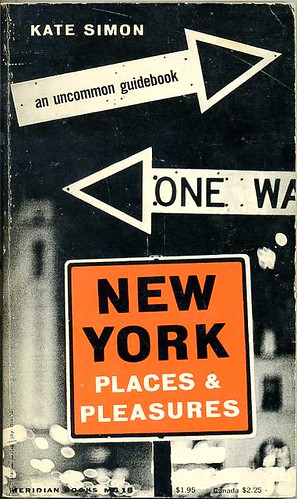New York Places and Pleasures — Cover design by Elaine Lustig and Jay Maisel from Kyle Katz’s amazing Flickr photostream (via Design Observer).
A Very Bad Man — Douglas Wolk, author of Reading Comics: How Graphic Novels Work and What They Mean, reviews the forthcoming Darwyn Cooke comic book adaptation of The Hunter by Richard Stark (AKA Donald Westlake) — which I can’t wait to get my hands on — for the Washington Post:
Cooke has a particular gift for the space-age designs and stripped-down chiaroscuro that were in vogue a half-century ago — he previously explored them in his “DC: The New Frontier” comics — and his loose, ragged slashes of black and cobalt blue evoke the ascendancy of Hugh Hefner so powerfully you can almost hear a walking jazz bass. At times, he seems to be demonstrating how few brushstrokes it can take to communicate a precise degree of amoral machismo. Parker’s a very bad man, but it’s hard to take your eyes off him.
More stuff about Darwyn Cooke and his Parker adaptation can be found at Almost Darwyn Cooke’s Blog (but not quite).
Buy Your Own Chains — The New Yorker’s Willing Davidson painfully accurate observation that low industry pay and unpaid internships skew what is published (via GalleyCat):
Tiny salaries in the low ranks of publishing are miserable for the young workers, but they’re probably worse for literature… It’s a truism of the industry that most of these jobs are held by people who can afford them—people with some parental support and no student loans. Often they’ve had unpaid internships, that most pernicious example of class privilege. Their superiors are the same people, ten years later. They—we!—are smart, cultured people with good intentions, but it’s easy to see how this narrow range could lead to a blinkered view of literature.
Which leads rather nicely to…
The Intern — Dark (and darkly funny) secrets from the lowest rung of this business we call publishing. See also Editorial Ass.
Gotham — I started with New York (and linked to The New Yorker somewhere in the middle), so I thought I’d wrap up with New York too. I came across The Mythic City: Photographs of New York by Samuel H. Gottscho, 1925-1940 a couple of weeks ago while looking for something completely different. It’s not new (it was published in 2005 to coincide with an exhibition at Museum of the City of New York), but the cover has stuck with me (something to do with the chunky cinematic type I think) and, by a happy coincidence, a copy of the book landed on my desk this week. It is beautiful. (Full disclosure: The Mythic City is published by Princeton Architectural Press who are distributed in Canada by the people who pay me).
Comments closed

